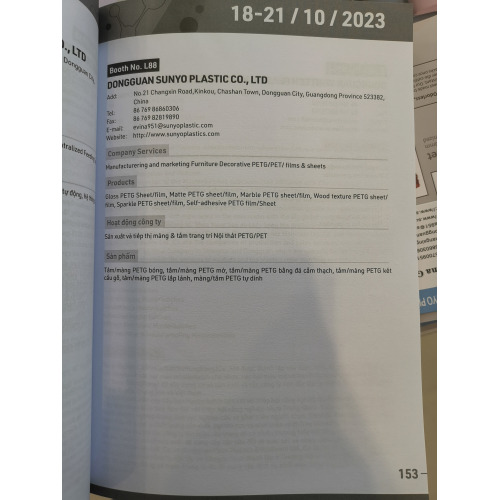Waterborne varnish is a green product. The solvent used is mainly water and some alcohols. The volatiles do not pollute the environment. Waterborne varnish has gradually developed in recent years as people's environmental protection demands continue to rise. At present, its technology is not mature enough, and the main problems are poor surface finishes, glossiness cannot achieve ideal results, etc.
The coating process of varnish is essentially the process of smoothing and drying the varnish on the printed matter. There are many factors that affect the gloss of waterborne coatings, such as the appearance quality of the material being coated, the coating process, the equipment, and the quality of the coating itself. The main discussion here is the performance of the waterborne coating on gloss. influences.
The factors affecting the gloss of the waterborne gloss oil include the proportion of the polymer monomer used in the resin, the proportion of the water-soluble resin and the emulsion, the leveling properties of the varnish, the viscosity, the pH value, and the surface tension.
1. Effect of Polymer Monomer on Glossiness of Waterborne Varnish
The different properties of the polymer monomers have an important influence on the gloss and other properties of the finished aqueous coating. Therefore, choosing the right polymer monomer is the most important aspect of improving the gloss of the aqueous coating. In practical use, a variety of monomers are usually used for copolymerization. When monomers are used, a large amount of additives with improved glossiness must be added, and the use of monomers for improving other properties of the coating oil should also be taken into consideration. In general, they can be selected from Table 1 for monomer copolymerization.
Examples of monomers that may be used in waterborne acrylic oils include methyl methacrylate, styrene, methyl acrylate, beta-hydroxypropyl acrylate, acrylic acid, and the like. Increasing the amount of methyl methacrylate and styrene, the resulting coating has high hardness and good gloss, but it is relatively brittle, and has poor folding and dissolution resistance. Therefore, in order to obtain a high gloss waterborne gloss, it is necessary to select a suitable polymer monomer.
2. Mix proportion of water-soluble resin and emulsion
As mentioned earlier, the proportion of the water-soluble resin and the emulsion has a great influence on the gloss of the aqueous coating oil. Increasing the amount of emulsion can increase its gloss, but it reduces the leveling and processability of varnish. Increasing the amount of water-soluble resin can improve the leveling and processability of varnish, but its gloss will decrease. . When preparing, reference can be made to the proportions in the previous recipe.
3, the effect of leveling on the gloss of waterborne coating
The leveling property of a waterborne coating is another important factor affecting its gloss, which is influenced by the viscosity, pH, and surface tension of the varnish.
If the coating has a good leveling property, it can quickly level up before the coating dries to form a smooth surface, the coating will have a high gloss; if the coating can not be dried before the leveling, Some streaks, blisters, etc. will be left behind to make it less glossy.
The key factor affecting the leveling property is the leveling viscosity of the varnish during the leveling process and its drying speed. If the leveling viscosity can be kept low and there is a small initial rate of change, the coating can be leveled faster. The leveling viscosity is related to the viscosity, pH value, thixotropy of the waterborne varnish, and the absorptivity of the coated article. The drying speed also affects the leveling property. If the speed is small, the change rate of the leveling viscosity is small, and the time for giving leveling is also large, and it can be fully leveled.
4, the viscosity of the gloss of the waterborne gloss oil
The viscosity of the aqueous coating oil has an important influence on the leveling and wettability of the coating during application. This is because the surface of the print has a certain degree of absorption of the varnish, and the absorption rate of the varnish on the surface of the print is directly proportional to the viscosity of the varnish. If the viscosity of the coating oil is too small, when the paper with high absorption rate is coated, the viscosity of the coating oil during the leveling process will change too much. In the initial stage, the viscosity can still meet the leveling requirements. But in the middle and later stages, the apparent viscosity of the varnish increases significantly, and it is difficult to meet the leveling requirements. As a result, the leveling ends prematurely, causing uneven coating on the surface of the printed matter, and some areas owed to the varnish affecting The degree of smoothness and gloss of the film after drying and calendering. If a low-absorption print is applied, the viscosity is too low, causing sagging, resulting in uneven coating and poor drying. If the viscosity is too high, the leveling will not be satisfied and the leveling will end prematurely and the gloss will deteriorate.
5, PH value of waterborne gloss gloss
The pH of the aqueous coating oil is mainly regulated by ammonia, and the pH of the general aqueous coating oil should be controlled between 8 and 9. If the pH is too high, the alkali is too strong, the viscosity of the varnish will be reduced, affecting the glossiness, and at the same time, the drying speed will be slower and the water resistance will be worse; when the pH is too low, the alkalinity is too weak, the viscosity will increase, and the ammonia Excessive volatilization during the leveling process causes the leveling to end too quickly, affecting the gloss.
6. Effect of Surface Tension on Waterborne Varnish
The surface tension of the varnish is not only an influence on the gloss but also an important factor affecting the overall quality of the varnish. Because the coating of varnishes is usually achieved in the field or ink film, and their surface free energy is usually small, the surface tension value of varnishes is very different from the wetting, adhesion, and soaking effects of the same prints. Large, the filming effect after coating and calendering is also very different. If the surface tension of the varnish is very small, the varnish will easily wet the surface of the print, and under the effect of the surface tension, it will easily flow into a smooth and uniform film surface; if the surface tension of the varnish is large, Therefore, the wetting of the ink film on the surface of the printed matter has difficulties, and it is not easy to form a uniform coating layer; when the value thereof is greater than the surface tension value of the printing ink film, the coating layer after coating will produce a certain shrinkage, even Occurrences such as trachoma appear in some areas.
The above are the main factors affecting the water-based coating. In addition, the solid content of the water-based varnish also affects its gloss. The effect of the solid content on the glossiness is similar to the viscosity. The general solid waterborne coating should be controlled at 30% to 40%.




